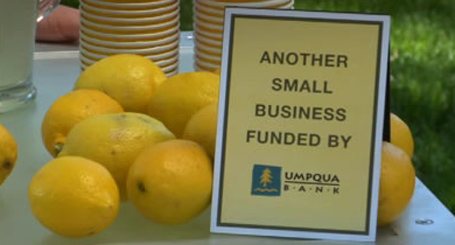 BusinessWeek: When it comes to being an entrepreneur, is it simply a matter of physiological hard wiring? Or is the entrepreneurial spark something that can be lit? Clearly, qualities such as risk taking and determination, common traits in many entrepreneurs, are part of one’s DNA. However, transforming inspiration into a business concept is one thing, and transforming a concept into an actual business is another. Can the characteristics often associated with entrepreneurs—drive, confidence, insight—be acquired? Can they be learned?
BusinessWeek: When it comes to being an entrepreneur, is it simply a matter of physiological hard wiring? Or is the entrepreneurial spark something that can be lit? Clearly, qualities such as risk taking and determination, common traits in many entrepreneurs, are part of one’s DNA. However, transforming inspiration into a business concept is one thing, and transforming a concept into an actual business is another. Can the characteristics often associated with entrepreneurs—drive, confidence, insight—be acquired? Can they be learned?
With more and more individuals eschewing the corporate ladder in order to start their own outfits at ever younger ages, BusinessWeek.com recently put the question to a cross-section of entrepreneurs and academics: Are entrepreneurs born or made?
Is There a Gene for Business? [BusinessWeek]
Category: Entrepreneurship
Kiddy Entrepreneurs

Springwise: Umpqua, an Oregon-based bank, recently launched something similar. Their Lemonaire campaign is aimed at helping ‘really small entrepreneurs’ start their first business: a lemonade stand. After completing an application, children can pick up a free Umpqua Lemonade Starter Kit. The kits include cups, napkins, a sticker, table cover, small business guide (‘How to Become a Lemonaire’) and USD 10 start-up capital. No purchase necessary, but children must be under 13 to qualify.
Unlike Postbank’s Bizznizz, Umpqua’s Lemonaire is a temporary campaign, and the marketing aspect is key here. As quoted in the New York Times, a spokesperson for Umpqua explained: “We look for ways to hit people with a different mindset, and the lemonade stand is a perfect metaphor for what small business is about.” Time for other banks to follow Umpqua and Postbank’s lead, offering junior entrepreneurs the tools they need to earn and save? As long as children aren’t forced into labour, it’s a great way to teach them about business and money.
Facilitating kidpreneurs [Springwise]
Understanding Opportunity Cost
 The Closet Entrepreneur: Identical twins Amal and Juan graduate with Bachelors degrees and receive the same job offer. Amal passes up the job offer to pursue a Masters degree while Juan takes the job offer and begins working. Two years pass and Amal graduates and begins working. By this time Juan has been promoted to a position that is comparable to Amal’s starting position, and Juan’s salary has increased to an amount that is comparable to Amal’s starting salary. So who made the better decision, Amal or Juan?
The Closet Entrepreneur: Identical twins Amal and Juan graduate with Bachelors degrees and receive the same job offer. Amal passes up the job offer to pursue a Masters degree while Juan takes the job offer and begins working. Two years pass and Amal graduates and begins working. By this time Juan has been promoted to a position that is comparable to Amal’s starting position, and Juan’s salary has increased to an amount that is comparable to Amal’s starting salary. So who made the better decision, Amal or Juan?
While the example of Amal and Juan is situational, opportunity costs definitely apply in the real world. Opportunity costs especially come into play when time is of the essence like starting a business, fixing and flipping an investment property, selling your home, et cetera.
In some cases, saving money by doing things yourself can be beneficial. Yet the benefit of saving money has to be weighed against the benefit of getting things done quickly and correctly by a professional. For example, anyone can learn how to build a website or remodel an investment property on their own, yet if doing so comes at a cost of several months of lost revenue or rent, then is it really worth it?
Opportunity costs even come into play in the pursuit of happiness. Which would you rather choose, lifelong happiness or a life of misery living out someone else’s dream?
Understanding Opportunity Costs = Better Decisions [The Closet Entrepreneur]
Next Better Idea
 Mind Petals: Well I’m here to challenge that notion about quitting and giving up. Yes, we should be quitters and give up on things in life. Just because we’re entrepreneurs, it doesn’t mean we have this “never-give-up” law up imprinted in our souls.
Mind Petals: Well I’m here to challenge that notion about quitting and giving up. Yes, we should be quitters and give up on things in life. Just because we’re entrepreneurs, it doesn’t mean we have this “never-give-up” law up imprinted in our souls.
Sure, if an idea turns into a mess and begins to bring unhappiness into your life, then get rid of it. Bury that baby! It’s perfectly fine to give up on an idea and push forward with something else.
Think of yourself as an scientist… actually, don’t think of yourself as one — you are a scientist. And as a scientist you are going to explore and experiment and fail. Some of your ideas will be solid, some weak, and some “so-so.”
But here’s the thing: you need to learn how to quickly get out of a “bad” idea and start searching for a “good” idea right away. The key here is to find an idea that you can focus on and truly explore for, well, the rest of your life possibly. But, if you continue to keep yourself trapped in a series of “so-so” ideas that are eating up your energy, creativity, and well-being, then you are going to be the demise of yourself — your entrepreneurial journey.
Learn when it’s time to put the nails in the coffin and bury your bad ideas. Learn this now and learn it fast. It’ll push your forward as an entrepreneur and there will be less weight on your shoulders. And the less weight on your shoulders, the easier it’ll be for you to move the world.
When is it Time to Put Your Idea in A Box, Nail it up, and Bury it for Good? [Mind Petals]
Lessons for Entrepreneurs

YoungEntrepreneur: How is that for a title to get your attention? CNNMoney recently put out a series of 8 profiles that look at successful entrepreneurs who have built up their companies despite not having access to major financial backing.
It goes to show you that you do not need a lot of money to get started – you just need to invest the capital you do have and your energy in the right places.
The profiles are a quick read and also include 8 lessons for success including:
Lesson: If you must borrow from your friends and family, keep it formal
Lesson: Prep as much as you can while you’re on someone else’s payroll
Lesson: Do what makes you happy – because at first, happiness is likely to be your main reward
Lesson: It’s not who you know – it’s how well you keep in touch with them
Lesson: You’ll amaze yourself at how cheaply you can run a business when it’s yours
Lesson: That great idea you had for your boss? Maybe it’s the business you’re looking for.
Lesson: Help investors see that taking a chance on you is not that big a risk after all
Lesson: Picking the right partner can be as important as picking a product
How To Get Rich [YoungEntrepreneur]